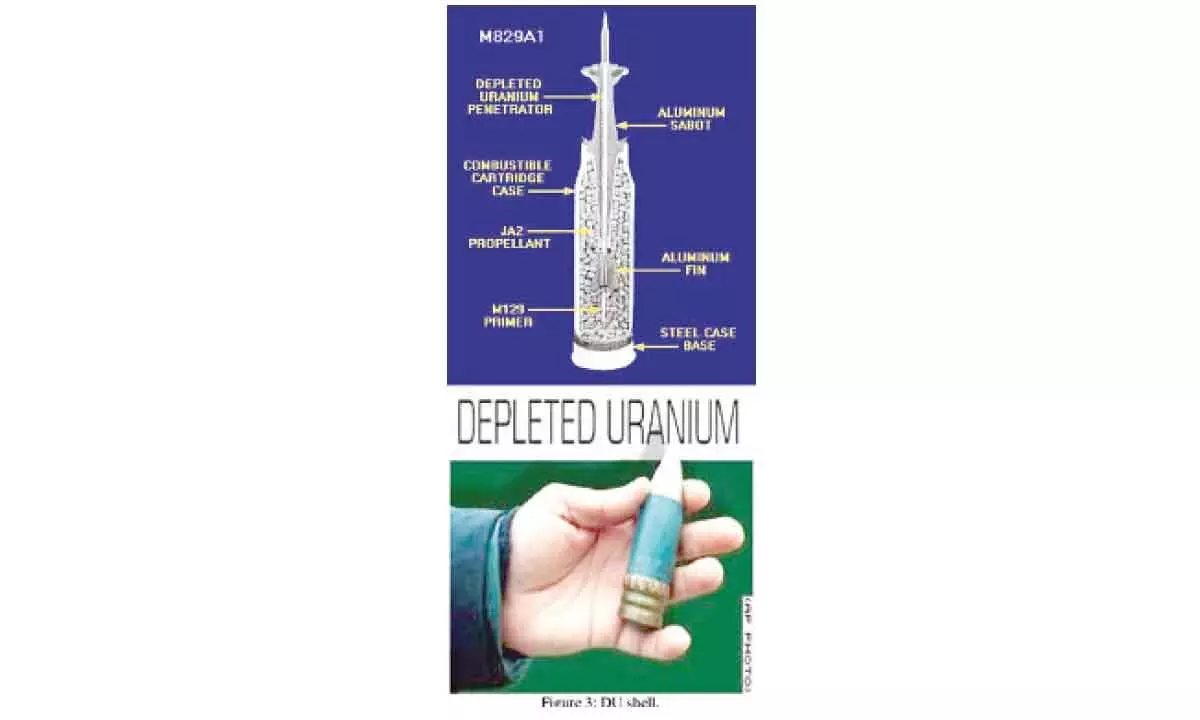Use of Depleted Uranium in Ukraine War: Not a bomb, but still a big risk

Russia and the UK continue to engage in a new, bitter war of words over the British side's plan to supply Ukraine with armour-piercing shells with Depleted Uranium for Challenger 2 battle tanks.
Moscow asserts that London has apparently already forgotten about the well-known dire consequences of the use of such toxic and radioactive munitions "during the conflicts unleashed by the West" in Yugoslavia and Iraq.
On the other hand, the UK government has accused the Kremlin of "deliberately trying to disinform," insisting that the British Army has used Depleted Uranium in its armour-piercing shells for decades and has nothing to do with nuclear weapons.
Depleted Uranium
Depleted uranium (DU; also referred to in the past as Q-metal, depletalloy or D-38) is uranium with a lower content of the fissile isotope.
It is a dense metal produced as a by-product of enrichment of natural uranium for nuclear fuel. It is still radioactive, but at a much lower level than the starting material. The official definition of Depleted Uranium given by the US Nuclear Regulatory Commission (NRC) is uranium in which the percentage fraction by weight of U-235 is less than 0.711 per cent.
Military uses
According to the International Atomic Energy Agency (IAEA), the world's central intergovernmental forum for scientific and technical cooperation in the nuclear field, Uranium's physical and chemical properties make it very suitable for military uses. Depleted Uranium is used in the manufacturing of ammunitions used to pierce armour plating, such as those found on tanks, in missile nose cones and as a component of tank armour.
Armour made of depleted uranium is much more resistant to penetration by conventional anti-armour ammunitions than conventional hard rolled steel armour plate. Such munitions were used in both Gulf Wars and in Serbia and Kosovo.
Health hazards
The US Department of Veterans Affairs has acknowledged that some of its Gulf War, Bosnia, Operation Enduring Freedom (OEF), Operation Iraqi Freedom (OIF), and Operation New Dawn (OND) veterans may have been exposed to Depleted Uranium when they were: on, in, or near vehicles hit with friendly fire; entering or near burning vehicles; near fires involving DU munitions; or salvaging damaged vehicles.
The potential for health effects from internal exposure is related to the amount of DU that enters a person's body. Inhaled DU particles are likely cleared from the lungs over several years. The IAEA notes that depleted uranium is mainly a toxic chemical, as opposed to a radiation hazard. Particles in aerosols can be inhaled or ingested, and while most would be excreted again, some can enter the blood stream and cause kidney damage.
While depleted uranium munitions are not considered nuclear weapons, their emission of low levels of radiation has led the U.N. nuclear watchdog to urge caution when handling and warn of the possible dangers of exposure. The handling of such ammunition "should be kept to a minimum and protective apparel (gloves) should be worn," the International Atomic Energy Agency cautions, adding that "a public information campaign may, therefore, be required to ensure that people avoid handling the projectiles.
The UK Ministry of Defence (MoD) says depleted uranium missiles were developed by the US and UK in the 1970s. They were first used in the Gulf War in 1991, and then in Kosovo in 1999, and during the Iraq War in 2003.
UK, Russia engage in serious sparring
Britain's Foreign Secretary James Cleverly has said there was no nuclear escalation in the Ukraine war after Russian President Vladimir Putin criticised Britain for supplying depleted uranium tank munitions to Ukrainian forces. But Putin has condemned British plans to send such ammunition to Ukraine, saying Moscow would be forced to respond accordingly as such weapons had "a nuclear component".
Cleverly said that Russia is the only country talking about mounting nuclear risks and the ammunition is conventional. "There is no nuclear escalation. The only country in the world that is talking about nuclear issues is Russia. There is no threat to Russia, this is purely about helping Ukraine defend itself," Cleverly said at the launch of Britain's international technology strategy. "It's worth making sure everyone understands that just because the word uranium is in the title of depleted uranium munitions, they are not nuclear munitions, they are purely conventional munitions."
Britain has used depleted uranium in its armour piercing shells for decades and does not consider those rounds as having a nuclear capability. Russia is known to also have ammunition containing depleted uranium. It is a particular health risk around impact sites, where dust can get into people's lungs and vital organs.
Russian Foreign Minister Sergei Lavrov said Britain was "taking this escalation to a new and very serious stage," while Russia's mission in Geneva accused London of prolonging the conflict and leaving "no chance for a political and diplomatic settlement of the Ukrainian crisis." Belarusian President Alexander Lukashenko, a close Putin ally, also waded into the row on Wednesday, saying Russia would retaliate against the British decision by providing Belarus with ammunition containing "real uranium."
(Agencies)















